|
|
|
Sort Order |
|
|
|
Items / Page
|
|
|
|
|
|
|
| Srl | Item |
| 1 |
ID:
166319
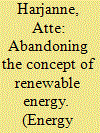

|
|
|
|
|
| Summary/Abstract |
Renewable energy is a widely used term that describes certain types of energy production. In politics, business and academia, renewable energy is often framed as the key solution to the global climate challenge. We, however, argue that the concept of renewable energy is problematic and should be abandoned in favor of more unambiguous conceptualization.
|
|
|
|
|
|
|
|
|
|
|
|
|
|
|
|
| 2 |
ID:
125513
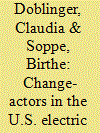

|
|
|
|
|
| Publication |
2013.
|
| Summary/Abstract |
We study the contribution of environmental groups to new technology adoption and diffusion by dominant incumbents. Building on institutional and social movement theory, we develop a theoretical framework that sheds light on environmental groups as change-actors. We theorize that by approaching embedded key constituents with various strategic actions, environmental groups affect taken-for-granted beliefs, build legitimacy for renewable energy technologies, and convince skeptical constituents to support the new technology. We verify our theoretical framework with a case study of wind power development in Colorado. We find that environmentalists educate constituents on the benefits of the new technology, engage in activities leading to regulatory and legislative decisions for wind, while also providing direct assistance to the utility. As a result, utilities are both pressured and encouraged to adopt and diffuse wind power on a large-scale. This research directs attention to the role of environmental groups as change-actors and the legitimating effects of their actions. It highlights their part in creating a more favorable institutional environment for new technologies while directly influencing the incumbent?s technology choice. This paper contributes to an understanding of bottom-up, actor-initiated changes in energy systems taking into account both the systemic technological infrastructure and the institutional context.
|
|
|
|
|
|
|
|
|
|
|
|
|
|
|
|
| 3 |
ID:
164347


|
|
|
| 4 |
ID:
120004


|
|
|
|
|
| Publication |
2013.
|
| Summary/Abstract |
The resilience of Asian firms in the face of the current economic downturn in North America and Western Europe is attracting renewed attention to the role of government in sustaining firm competitiveness. The paper adds to this debate by drawing from institutional theory to assess the impacts of selected formal government institutions on business performance in the Philippines. Based on a large-scale survey (n = 658) of business owners in the Philippines undertaken by the World Bank, the study finds that access to finance, the rule of law and regulatory quality contribute significantly to business performance. The policy implications of the findings are fully discussed, along with avenues for future research.
|
|
|
|
|
|
|
|
|
|
|
|
|
|
|
|
| 5 |
ID:
106249
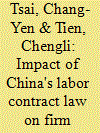

|
|
|
|
|
| Publication |
2011.
|
| Summary/Abstract |
This study extends research on issues relating to China's Labor Contract Law to clarify the relationship between the introduction of the legislation and Taiwanese investments in China, interacting with any industry effect. It also examines how Taiwanese firms' degree of dependence on China is associated with their performance. Models, based mainly on eclectic theory and institutional theory, are employed to test hypotheses using panel data from 1,015 Taiwanese investments in China over twentyfive quarters. The findings reveal that the adoption ofChina's Labor Contract Law and Taiwanese firms' dependence on China are not always associated with firm performance, and industry factors can, under some circumstances, moderate the impact of the Law on firm performance. The findings provide business practitioners with evidence as to whether a new law (in this case, the Labor Contract Lawof China) can have an impact on a firm and how much the industry effect matters.
|
|
|
|
|
|
|
|
|
|
|
|
|
|
|
|
| 6 |
ID:
106331
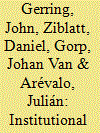

|
|
|
|
|
| Publication |
2011.
|
| Summary/Abstract |
Most governance arrangements involve spatial units with highly unequal powers, for example, a feudal monarchy and its principalities, an empire and its colonies, a formal empire and an informal empire (or sphere of influence), a national government and its subnational entities, or a regional government and its local entities. In this situation, the dominant unit (A) usually enjoys some discretion about how to institutionalize its authority over the subordinate unit (B). An important element of this decision concerns how much authority should be delegated to the weaker unit. The authors simplify this dimension of governance along a continuum of "direct" and "indirect" styles of rule. Why, in some cases, does one find a relatively direct (centralized) system of rule and in others a relatively indirect (decentralized) system of rule? While many factors impinge on this decision, the authors argue that an important and highly persistent factor is the prior level of centralization existing within the subordinate unit. Greater centralization in B is likely to lead to a more indirect form of rule between A and B, all other things being equal. The authors refer to this as an institutional theory of direct/indirect rule. Empirical analyses of this hypothesis are applied to patterns of direct and indirect rule (1) during the age of imperialism and (2) across contemporary nation-states. The article concludes by discussing applications of the theory in a variety of additional settings.
|
|
|
|
|
|
|
|
|
|
|
|
|
|
|
|
| 7 |
ID:
114080
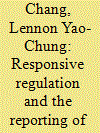

|
|
|
|
|
| Publication |
2012.
|
| Summary/Abstract |
As most software used by government agencies and companies is proprietary, malicious computer activity targeting breaches in that software can be likened to a pandemic of an infectious disease in the cyber world. When a breach occurs, the consequences can be widespread and damaging because the damage can spread rapidly. Therefore, cybercrime prevention needs to involve all users in a cooperative effort,with warnings and information on countermeasures distributed to users in order to prevent the "disease" from spreading when unprotected computers encounter an attack. This cooperative effort relies heavily on all institutions reporting information security incidents. Based on institutional theory, together with regulatory pluralism and responsive regulation theory, this paper examines the pluralized regulatory approach adopted to promote a system for sharing reports of information security incidents in Taiwan and China. An expanded model of regulatory enforcement and a strengths-based pyramid are proposed and used as a framework for discussing existing systems for encouraging the reporting of information security incidents.
|
|
|
|
|
|
|
|
|
|
|
|
|
|
|
|
| 8 |
ID:
149438
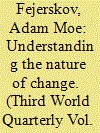

|
|
|
|
|
| Summary/Abstract |
This article argues that core lines of sociological institutionalist thought provide a set of valuable conceptual and theoretical vocabularies for exploring and explaining contemporary concerns of development cooperation. It identifies four broad categories of issues of central attention in the current study of development cooperation, and couples these with four avenues of sociological institutional research that may provide us with theoretical and conceptual frameworks for further empirically exploring and theoretically extrapolating these. Increasing attention to these theoretical concerns not only helps us progress the study of development cooperation, it may also allow us to inform contemporary institutional thinking.
|
|
|
|
|
|
|
|
|
|
|
|
|
|
|
|
|
|
|
|
|